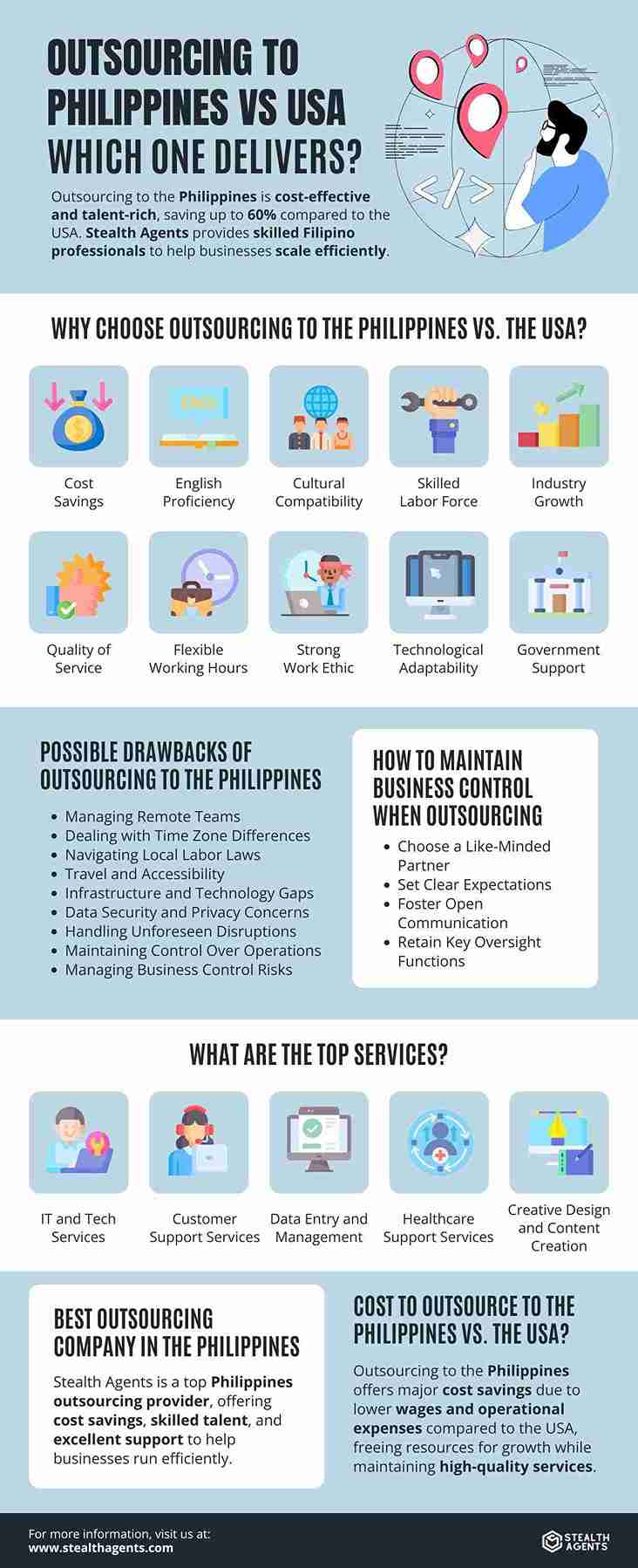Outsourcing to the Philippines is a cost-effective and talent-rich solution compared to hiring in the USA. Stealth Agents helps businesses save up to 60% while scaling faster by providing skilled Filipino professionals tailored to their goals. Book a free consultation today at stealthagents.com.
The Philippines continues to dominate the global outsourcing market, accounting for 15% of the world’s BPO industry and employing over 1.4 million professionals across customer service, IT, and back-office operations.
In contrast, U.S.-based outsourcing commands higher costs but offers proximity and cultural alignment for domestic firms, which is why many us company in the philippines venture. Businesses comparing both find that outsourcing to the Philippines can reduce operational expenses by up to 70% while maintaining service quality.’
Partnering with a trusted global provider like Stealth Agents ensures access to the Philippines’ top-tier talent with U.S.-level reliability, delivering performance, scalability, and cost efficiency.
Outsourcing to the Philippines can cut labor and overhead costs by up to 60–70% compared to hiring equivalent staff in the USA without compromising quality, thanks to strong English proficiency, Western cultural familiarity, and mature BPO infrastructure.
The Philippines’ IT-BPM industry generated USD 38 billion in revenue in 2024 with 1.82 million workers, growing ~7% year-on-year, even as demand from North America remains one of its strongest drivers. Meanwhile, U.S.-based employees demand higher salaries plus benefits, taxes, and workspace costs that often make comparable roles two to three times more expensive.
If you want to outsource without sacrificing performance, Stealth Agents combines the cost advantages of Filipino talent with strong quality control, fast onboarding, and trusted service delivery.
Outsourcing has emerged as a strategic tool for companies seeking efficiency, expertise, and cost savings.
Choosing whether to outsource to the Philippines or the USA presents a crucial crossroads for businesses, especially when considering the outsourcing to philippines vs usa price rate to optimize operations.
Why Choose Outsourcing to the Philippines vs. the USA?
1. Cost Savings:
One of the primary advantages of outsourcing to Philippines is the significant cost reduction.
Companies can save up to 60% on expenses compared to outsourcing in the USA.
This cost-effectiveness is particularly appealing for businesses looking to optimize their budgets without sacrificing quality.
The lower cost of living in the Philippines allows for competitive pricing in the outsourcing industry.
These savings can be redirected to other critical business areas, fostering growth and innovation.
2. English Proficiency:
The Philippines is renowned for its strong English language skills, which are crucial to successful outsource philippines.
As the third-largest English-speaking country in the world, communication with Filipino professionals is seamless and practical.
This proficiency minimizes misunderstandings and enhances collaboration between international teams.
Filipino workers are often educated in English, ensuring they’re well-prepared for communication tasks.
This language capability makes the Philippines an attractive destination for businesses requiring strong verbal and written communication.
3. Cultural Compatibility:
The cultural compatibility between the Philippines and Western countries is another compelling reason to outsource here.
Many Filipinos are familiar with Western customs and business practices, creating a smoother integration into international teams.
This cultural alignment reduces the learning curve and fosters a positive working relationship.
The Filipino workforce is known for its adaptability and flexibility when working with diverse cultures.
Such compatibility enhances productivity and contributes to a more cohesive work environment.
4. Skilled Labor Force:
The Philippine outsource a vast pool of skilled professionals across various industries, particularly in customer service, tech support, and creative fields.
The country strongly emphasizes education and skill development, resulting in a competent workforce ready to tackle diverse challenges.
Outsourcing to the Philippines means tapping into this talent reservoir, which can significantly benefit businesses looking for quality services.
The availability of skilled labor ensures that companies receive competent and reliable service.
This abundance of talent makes the Philippines a preferred outsourcing destination for many global businesses.
5. Industry Growth:
The outsourcing industry in the Philippines is experiencing rapid growth, with an impressive annual increase of 20%.
This growth indicates a robust and competitive sector that is continuously expanding and improving. Many companies turn to top virtual assistant companies in the Philippines to tap into this skilled talent pool and stay competitive.
Businesses choosing to outsource here can leverage this dynamic industry to achieve their strategic commitment to enhancing their outsourcing capabilities, making it an ideal partner for long-term engagements.
This growth also means that the Philippines continually innovates and adapts to global trends, ensuring relevant and up-to-date services.
6. Quality of Service:
Filipino workers are known for their dedication to providing high-quality service.
The emphasis on customer satisfaction is evident in the meticulous attention to detail and commitment to meeting client needs.
Businesses outsourcing to the Philippines can expect excellent service aligning with their standards.
The cultural value placed on hospitality further enhances the quality of service provided.
This focus on quality ensures businesses can maintain their reputation while benefiting from outsourcing.
7. Flexible Working Hours:
Many outsourcing services in the Philippines offer flexible working hours to accommodate different time zones, particularly in the West.
This flexibility means businesses can maintain 24/7 operations without overextending their local workforce. The Filipino workforce’s willingness to adjust to various schedules is a significant advantage for companies requiring round-the-clock support.
Such adaptability ensures that businesses can provide uninterrupted service to their customers.
This flexibility benefits industries like customer support, technical assistance, and virtual assistants.
8. Strong Work Ethic:
Filipinos are recognized for their strong work ethic, diligence, reliability, and positive attitude.
This work ethic is crucial for businesses relying on outsourced teams to meet deadlines and maintain quality.
The dedication of Filipino workers often translates to higher productivity and efficiency.
Employers can trust their outsourced teams to handle tasks with responsibility and care.
This reliable workforce is a cornerstone of the Philippines’ attractiveness as an outsourcing destination.
9. Technological Adaptability:
The Philippines is increasingly investing in technology and infrastructure to support its booming outsourcing industry.
This commitment to technological advancement ensures that the country remains competitive in delivering cutting-edge services.
Businesses outsourcing Philippines benefit from the country’s willingness to adopt new technologies and methods.
This adaptability is crucial for industries that rely heavily on technology, such as IT and digital marketing. The country’s focus on tech readiness makes it a forward-thinking partner in outsourcing.
Addressing Infrastructure and Technology Challenges
Of course, no system is perfect. While the Philippines continues to progress, some providers may still face challenges such as slow internet connectivity or reliance on outdated technologies. Partnering with a virtual assistant san francisco or a virtual assistant New York can help bridge operational gaps and maintain service consistency when these challenges arise. These issues can influence business performance and the overall customer experience if left unaddressed.
How to ensure tech readiness with your outsourcing partner:
- Encourage regular technology upgrades: Support your BPO partner in adopting the latest digital tools, automation solutions, and cloud-based platforms like Contact Center as a Service (CCaaS) to reduce manual work and accelerate business processes.
- Collaborate with local IT experts: Working together can help guarantee the use of efficient and appropriate technology tailored to your specific needs.
- Promote a forward-thinking mindset: Continuous investment in infrastructure and tech not only keeps your operations running smoothly but also positions you to take advantage of future innovations.
10. Government Support:
The Philippine government actively supports the outsourcing industry through incentives and policies encouraging growth and development.
This support helps create a stable and conducive environment for businesses looking to outsource.
Companies can benefit from the government’s initiatives to improve infrastructure and workforce training.
The commitment from the government ensures a sustainable and thriving outsourcing industry.
Such backing provides confidence to foreign businesses considering the Philippines as their outsourcing hub.
Possible Drawbacks of Outsourcing to the Philippines
While the advantages of outsourcing to the Philippines are numerousit’s‘s important to take a balanced view and recognize that challenges can arise along the way, by being aware of potential pitfalls, businesses can plan ahead and ensure smoother, more productive partnerships.
1. Managing Remote Teams
Working with teams located in many time zones introduces a new layer of complexity. Communication is typically conducted via digital platforms, and this separation can make it tougher to foster strong relationships, set expectations, and swiftly resolve issues. Tracking productivity and maintaining alignment with company culture may also become more demanding.
How to Address:
Prioritize seamless, ongoing communication. Schedule regular check-ins, even if it requires the occasional late-night coffee. Establish clear performance metrics and invest in collaborative tools for project tracking. When possible, create opportunities for team-building, even in virtual formats.
2. Dealing with Time Zone Differences
Collaborating with a workforce halfway across the globe sometimes means team meetings at odd hours and delayed responses. These time discrepancies may occasionally slow down decision-making and customer resolutions.
How to Address:
Develop a work schedule that provides overlapping hours, sthere’s’s always a window for real-time collaboration. Use shared calendars and project management apps to keep everyone in sync, and set clear expectations for response timelines.
3. Navigating Local Labor Laws
The regulatory landscape in the Philippines gives strong protections to workers, including requirements around wages, benefits, and working conditions. For unfamiliar businesses, this can be an administrative quagmire, and missteps may result in penalties.
How to Address:
Consult with local HR or legal experts familiar with Philippine labor laws. Ensure that your outsourcing contracts are reviewed carefully to meet all compliance requirements, and use payroll providers who are experienced in local regulations.
4. Travel and Accessibility
Occasionally, in-person visits are invaluable for building relationships or overseeing new project launches. However, regular travel to the Philippines may be expensive, time-consuming, or logistically tricky, especially for those based in the Americas or Europe.
How to Address:
Plan essential trips well in advance and make the most of video conferencing technology between visits. When travel is necessary, schedule a slate of meetings or trainings together to maximize value.
5. Infrastructure and Technology Gaps
Despite significant improvements, infrastructure challenges such as fluctuating internet connectivity and power interruptions can still occur in certain regions. These disruptions may hinder operations or impact customer service levels if not managed proactively.
How to Address:
Choose partners who invest in backup connectivity, reliable hardware, and regularly updated technology. Consider asking about their disaster recovery and business continuity plans before committing.
6. Data Security and Privacy Concerns
Outsourcing often involves sharing sensitive customer or business information and raising questions about data privacy and, Without stringent controls, there’s a risk of information leakage or breaches.
How to Address:
Implement clear security protocols and require vendors to follow global data privacy standards (such as GDPR or HIPAA, if applicable). Work closely with IT teams to audit systems, encrypt data, and train employees on best security practices.
7. Handling Unforeseen Disruptions
Natural events, typhoons, flooding, and earthquakes can disrupt business operations. There is also the consideration of local public holidays and, at times, political uncertainty.
How to Address:
Create contingency plans with your outsourcing provider. Maintain a hybrid team structure where core, business-critical functions remain in-house to ensure continuity during unexpected events.
8. Maintaining Control Over Operations
Entrusting key business functions to an external provider means relinquishing some degree of oversight. Misaligned expectations, cultural differences, or inadequate due diligence can lead to inconsistent outcomes.
How to Address:
Engage vendors with shared values and a proven track record. Foster transparency and keep key decision-making rights within your organization. Nurturing a collaborative relationship with frequent feedback will help ensure your objectives remain front and center.
By understanding these potential drawbacks and taking proactive steps to address them, companies can enjoy the full benefits of outsourcing to the Philippines while minimizing risk.
9. Managing Business Control Risks
While outsourcing to the Philippines offers numerous advantages’s natural to have concerns about maintaining business control. Entrusting core operations or client-facing tasks to an external partner can sometimes feel like letting go of the reins, a worry shared by many organizations, from startups to global giants like IBM and Accenture.
Potential Risks:
- Loss of direct oversight over day-to-day activities
- Inconsistent adherence to company standards or values
- Possible misalignment of long-term objectives
- Delays or breakdowns in communication
How to Maintain Business Control When Outsourcing
Choose a Like-Minded Partner:
Look for an outsourcing provider whose company culture, values, and work ethic align with yours. This cultural synergy helps ensure businesses’ standards are reflected in every interaction.
Set Clear Expectations:
Outline your goals, KPIs, and quality benchmarks from the start. Documented guidelines leave less room for confusion and help both parties stay on track.
Foster Open Communication:
Maintain regular, structured check-ins, whether through email, video calls, or project management platforms like Asana or Slack. This ongoing dialogue helps catch issues early and keeps teams focused on shared objectives.
Retain Key Oversight Functions:
Instead of handing over entire departments, keep strategic oversight in-house or maintain a dedicated liaison. This way, you have direct input over critical decisions while your outsourcing partner handles execution.
Managing Offsite in the Philippines: Overcoming the Challenges
Despite the many benefits of outsourcing to the Philippines, managing teams remotely can come with its own set of challenges. One of the most common hurdles faced by businesses is ensuring effective oversight and seamless collaboration with offsite.
When your team operates from a different location, particularly across borders, the reliance on digital communication channels can sometimes create misunderstandings, delays, or gaps in feedback. These challenges can make it difficult to monitor performance in real-time or swiftly implement necessary improvements.
How can businesses address these challenges?
To foster a productive relationship with your outsourced team in the Philippines, consider the following strategies:
- Prioritize Clear Communication: Establish regular check-ins through video calls or collaboration platforms like Slack or Microsoft Teams to bridge the distance and keep everyone informed.
- Implement Robust Performance Monitoring: Develop a quality assurance program to consistently evaluate outcomes and provide constructive feedback.
- Invest in Staff Development: Ensure offsite employees have access to ongoing training and resources, equipping them to meet your company’s standards.
- Cultivate Collaboration: Encourage a supportive work environment where your Filipino team feels valued and empowered to share ideas or raise concerns.
Finding the Right Balance: In-House and Outsourced Teams
Finding the right balance between in-house and outsourced teams is key to long-term success. A strategic blend allows a business to leverage the distinct advantages of both models, creating a resilient and agile workforce.
Your in-house team is the core of your organization. They safeguard institutional knowledge, embody your company culture, and drive long-term strategy and innovation. This internal group is essential for navigating challenges unique to your business.
Conversely, outsourcing provides specialized expertise, cost efficiencies, and the flexibility to scale operations on demand. Partners, especially in thriving markets like the Philippines, allow you to tackle specific projects or manage fluctuating workloads without overextending your primary staff.
The Philippines’ robust BPO sector offers adaptable teams experienced in supporting global clients, making it a compelling choice for business growth.
By combining an agile in-house workforce with targeted outsourcing, you create a diversified operational structure. This synergy enhances your ability to manage change, maximizes the strengths of both arrangements, and positions your organization for sustained growth.
Privacy and Security Considerations When Outsourcing
While the advantages of outsourcing to the Philippines are significant’s’s essential to be mindful of privacy and data security risks that may arise when entrusting sensitive business information to an offshore partner.
Companies must ensure that confidential data, ranging from customer information to proprietary business processes, is protected against unauthorized access and cyber threats.
This includes the risk of data breaches or leaks, which could occur if robust cybersecurity measures are not put in place.
To address these concerns, businesses should:
- Establish clear data protection policies and communicate them effectively to the entire outsourced team.
- Partner with vendors who comply with international security standards (such as ISO 27001 or GDPR, if relevant to your market).
- Engage local IT experts who can help implement firewalls, secure networks, and up-to-date encryption technology.
- Regular security training is required for staff to recognize and prevent cyber threats.
- Monitor compliance and conduct periodic security audits to ensure continuous protection.
Navigating Natural Disasters and Operational Disruptions
While the Philippines offers an impressive array of advantages for outsourcing, it is wise to recognize potential operational disruptions that can occasionally arise.
The country’s tropical climate means it is no stranger to typhoons and flooding, which can sometimes impact power, internet connectivity, and transportation. In addition, unplanned geopolitical developments or even local holidays may temporarily affect normal business operations.
That said, these challenges are far from insurmountable. Many businesses choose to maintain a core in-house team alongside their outsourced workforce to provide seamless coverage during unexpected disruptions’s also prudent to develop a solid contingency plan tailored to your operations, which might include data backups, alternative communication channels, and proactive monitoring of weather and news updates.
By preparing for these rare disruptions, businesses can continue to operate smoothly and minimize any potential impact, making the most of the Philippines’ many outsourcing strengths.
Understanding Labor Laws and Compliance in the Philippines
Navigating Philippine Labor Laws for Outsourcing
When considering outsourcing to the Philippines, it’s important to understand the local labor laws that govern employer-employee relationships.
These regulations are designed to protect workers’ rights and ensure fair compensation, and they are strictly enforced by government agencies.
Key labor requirements include:
- Minimum Wage: The government sets minimum wage rates, which may vary between regions and are adjusted periodically.
- 13th Month Pay: All employers must provide a 13th-month salary benefit, equivalent to one-twelfth of aemployee’s’s annual base pay, usually paid before the end of each year.
- Overtime and Night Shift Pay: Philippine law mandates appropriate compensation for overtime, night shifts, and holiday work, with explicit formulae for calculating these additional payments.
- Employee Benefits: Employers must contribute to government-mandated programs like the Social Security System (SSS), PhilHealth, and Pag-IBIG Fund (housing), ensuring employees receive crucial social benefits.
What are the top services?
-
Customer Support Services:
Outsourcing customer support to the Philippines rather than the USA is often a strategic choice due to the Philippines’ strong customer service culture.
Filipinos are known for their polite and accommodating nature, making them ideal for roles requiring direct client The country’s high English proficiency ensures clear and effective communication, which is essential for customer satisfaction.
Additionally, the cost of customer support outsourcing services in the Philippines is considerably lower than in the USA, allowing companies to save significantly on operational costs.
The combination of excellent service quality and affordability makes the Philippines a top choice for outsourcing customer support.
-
IT and Tech Services:
The decision to outsource IT services to the Philippines vs. the USA often leans towards the Philippines due to its growing pool of tech-savvy professionals.
The country has a robust educational system that emphasizes IT and tech skills, producing a workforce adept in various technological domains.
Filipino IT specialists can handle various tasks, from software development to network management, at a fraction of the cost compared to their American counterparts.
Moreover, the Philippine government supports the tech industry with initiatives to improve infrastructure and digital skills.
This environment fosters innovation and makes the Philippines an attractive destination for IT outsourcing.
-
Creative Design and Content Creation:
When comparing outsourcing to the Philippines vs. the USA for creative services, the Philippines offers a unique blend of creativity and cost-efficiency.
The country is home to a burgeoning community of talented graphic designers, video editors, and content creators who can deliver high-quality work.
Filipino creatives are often praised for their ability to understand global trends and produce content that resonates with diverse audiences.
The cost savings in outsourcing creative services to the Philippines allow businesses to allocate their budgets to other strategic areas.
Many companies choose the Philippines for their creative projects because of talent and affordability.
-
Data Entry and Management:
Outsourcing to the Philippines vs the USA for data entry services provides businesses access to meticulous and detail-oriented professionals.
The Philippines has a large pool of workers experienced in handling data-related tasks, ensuring accuracy and efficiency.
Businesses can benefit from the lower costs associated with data management services in the Philippines while maintaining high-quality standards.
This cost-effectiveness allows companies to streamline their operations without compromising on data integrity.
The country’s commitment to precision and quality control makes it a preferred choice for data entry outsourcing.
-
Healthcare Support Services:
The healthcare industry has increasingly turned to outsourcing to the Philippines rather than the USA for support services like medical transcription, billing, and coding.
The Philippines offers a cost-effective solution with professionals trained in handling sensitive healthcare information.
Filipino workers are known for their attention to detail and adherence to confidentiality, which is crucial in the healthcare sector.
The affordability of healthcare support services in the Philippines allows medical institutions to focus resources on patient care rather than administrative tasks.
This strategic outsourcing choice ensures that healthcare providers can maintain high-quality services while optimizing their budgets.
How Much Does It Cost to Outsource to the Philippines vs. the USA?
When comparing outsourcing costs to the Philippines versus the USA, businesses often find substantial savings by choosing the Philippines.
The primary reason for this is the significant difference in labor costs, as wages in the Philippines are considerably lower than in the USA.
This cost advantage extends beyond salaries to include operational expenses, such as office space and utilities, which are also more affordable in the Philippines.
These savings can free up valuable resources for businesses, allowing them to invest in other areas like research and development or marketing.
Ultimately, the affordability of outsourcing to the Philippines can play a pivotal role in businesses’ strategic planning, enabling them to optimize their budget while still maintaining high-quality services.
What is the best outsourcing company in the Philippines?
Stealth Agents stands out as the premier outsourcing company in the Philippines, renowned for its exceptional service quality and comprehensive offerings.
Stealth Agents has become a trusted partner for businesses worldwide with a solid reputation built over years of delivering reliable and effective outsourcing solutions.
Their commitment to excellence is evident in their focus on tailoring services to each client’s specific needs, ensuring both efficiency and satisfaction.
The company excels in providing a wide range of services, from virtual assistance to customer support, all backed by highly skilled professionals.
Their dedication to maintaining high standards makes them a top choice for companies looking to optimize their operations through outsourcing.
-
Cost-Effectiveness: Stealth Agents offers competitive service pricing, allowing businesses to save significantly on operational costs without compromising quality.
-
Skilled Workforce: The company boasts a team of well-trained, experienced professionals who are adept at handling diverse tasks, ensuring reliable and efficient service delivery.
-
Excellent Customer Service: Stealth Agents prioritizes customer satisfaction, providing responsive and personalized support so that the clients’ needs are met promptly and effectively.
Final Thoughts
Several compelling advantages make the Philippines an attractive option for outsourcing a virtual assistant agency compared to the USA.
Lower labor and operational expenses allow businesses to achieve substantial cost savings, allowing them to allocate resources more effectively.
The skilled workforce in the Philippines is well-trained and proficient in English, ensuring high-quality service delivery across various sectors.
Moreover, the country’s commitment to excellence and customer satisfaction enhances its reputation as a reliable outsourcing hub.
For companies looking to optimize their operations, a strategic move is to hire a virtual assistant from the Philippines, offering both efficiency and affordability in one package.
Looking to save money while getting great talent? Outsourcing to the Philippines can help you cut costs and find skilled workers. Book a call to learn more.
Frequently Asked Questions
What are the key differences when outsourcing to the Philippines vs the USA?
When outsourcing, a key difference between the Philippines and the USA is the talent pool and cultural alignment. The Philippines has a large, highly-educated workforce with strong English proficiency and a culture known for its excellent customer service and hospitality. This makes it ideal for roles in customer support, administrative tasks, and back-office operations. In contrast, the USA offers a domestic talent pool that may have a deeper understanding of local market nuances and regulations, which can be beneficial for roles requiring specific in-market knowledge.
How do tax implications differ between Philippines and USA outsourcing?
In the USA, outsourcing may involve payroll taxes, workers’ compensation, and benefits compliance. In the Philippines, agencies like Stealth Agents handle taxes for their workers, so businesses don’t have to worry about these costs. However, it’s important to check with a tax expert about any reporting or withholding requirements for international services.
Which industries perform better with Philippines vs USA outsourcing?
The Philippines is great for customer service, data entry, digital marketing, and admin tasks because of its cost savings and cultural fit. The USA is better for industries like healthcare, legal services, and government work that require domestic providers. Both locations work well for technology and creative services.
What contract terms should I expect with Philippines vs USA providers?
Philippines providers often offer flexible month-to-month contracts and easy scaling. USA providers usually require longer contracts with detailed rules about performance and penalties. Contracts in the Philippines often include free replacements, while USA contracts focus more on protecting intellectual property and liability.
How does the hiring timeline compare between Philippines and USA outsourcing?
Hiring in the Philippines through agencies like Stealth Agents takes about 5-10 days because they have pre-vetted talent ready to start. In the USA, hiring can take 2-6 weeks due to longer processes like interviews, background checks, and onboarding.
What backup options exist if Philippines outsourcing fails vs USA alternatives?
Philippines providers often offer free replacements and have large talent pools for quick substitutions. USA providers may have fewer backup options and might charge fees for replacements. Some businesses use a mix of both locations or nearshore options like Mexico for faster support and closer time zones.
How do intellectual property protections compare between Philippines and USA?
The USA has stronger legal protections for intellectual property (IP) through its courts and laws. The Philippines follows international agreements for IP protection, but enforcement can be harder. To stay safe, use NDAs, work-for-hire agreements, and consider registering your IP in both countries.
What are the minimum engagement requirements for Philippines vs USA outsourcing?
Philippines providers often require full-time commitments (40 hours per week) because part-time work can lead to higher turnover. USA providers are more flexible and offer part-time options, but these come at higher rates. Many agencies in the Philippines don’t offer part-time services to keep workers long-term.
How do performance monitoring capabilities differ between Philippines and USA providers?
Philippines providers often include tools like screenshot tracking, activity monitoring, and detailed reports. They may also assign campaign managers to oversee work. In the USA, monitoring is usually less detailed due to privacy rules, and clients are expected to manage more on their own.
What insurance and liability coverage differs between Philippines vs USA outsourcing?
USA providers usually have strong insurance coverage, including liability insurance, errors & omissions coverage, and workers’ compensation. Philippines providers may have limited insurance, so businesses should rely on contracts for protection. You can also ask for proof of insurance or add international coverage to your own policy.












